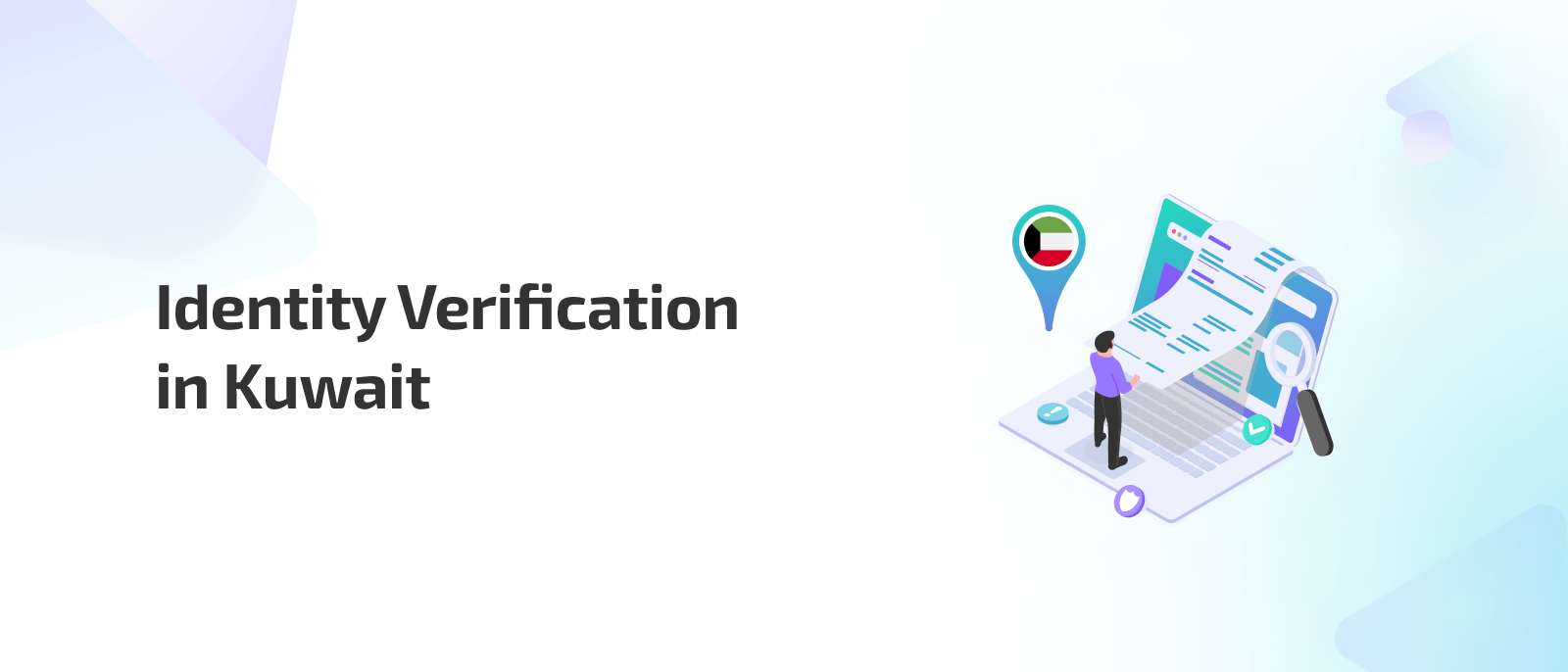Identity Verification in Kuwait: Requirements & AML Best Practices

Accelerate AML Compliance: Meet Regulatory Demands with 80% Less Setup Time
Amongst other procedures and mechanisms, according to the Central Bank of Kuwait:
“Banks shall have in place policies, procedures, and internal control systems that ensure the combating of money laundering and the financing of terrorism. These should include: Identifying the customer's identity and the actual beneficiary, including politically exposed persons, and specifying the documents required for verification.”
Regulatory Framework Governing Identity Verification in Kuwait
Kuwait's regulatory framework for identity verification is anchored in its commitment to combat money laundering and terrorist financing, aligning with international standards. Financial institutions operating within Kuwait are mandated to adhere to stringent Know Your Customer (KYC) and Anti-Money Laundering (AML) protocols, as outlined in the Anti-Money Laundering and Combating the Financing of Terrorism Law No. (106) of 2013.
This legislation, enforced by the Central Bank of Kuwait (CBK) and the Kuwait Financial Intelligence Unit (KFIU), requires institutions to perform comprehensive customer due diligence, verify customer identities, and monitor transactions for suspicious activities.
1. Law No. 106 of 2013 on AML/CFT
This law serves as the primary legislation for AML and Counter-Terrorism Financing (CTF) in Kuwait. It mandates financial institutions to implement customer due diligence (CDD) measures, including the verification of customer identities using reliable, independent source documents, data, or information.
The law also requires the maintenance of records and the reporting of suspicious transactions to the Kuwait Financial Intelligence Unit (KFIU).
2. Central Bank of Kuwait (CBK) Instructions
The CBK has issued several instructions to reinforce AML and CTF efforts. Notably, Instruction No. (2/BS, IBS/308/2013) outlines the procedures for verifying customer identities, emphasizing the need for financial institutions to adopt a risk-based approach in their CDD processes.
3. Ministry of Commerce and Industry (MOCI) Regulations
The MOCI plays a pivotal role in enforcing AML regulations, particularly concerning the verification of beneficial ownership information. Financial institutions are required to audit and verify the data of actual beneficiaries to ensure the creation of a complete and reliable database.
4. Legal Ramifications for AML Violations in Kuwait
Under Article 28 of Kuwait’s Anti-Money Laundering Law, individuals found guilty of knowingly engaging with funds derived from illicit sources face severe consequences. These may include imprisonment for a period of up to ten years, in addition to financial penalties ranging from 50% to 100% of the value of the laundered assets.
Moreover, any assets, instruments, or proceeds linked to the criminal activity are subject to mandatory confiscation by the authorities.
5. Enhanced Sentencing for Aggravated Offenses
In cases where the offense involves aggravating factors, such as recidivism, organized crime, or abuse of professional authority, Article 30 provides for escalated sanctions.
The maximum prison term may extend to 20 years, and monetary fines can reach up to twice the amount specified for standard violations. These heightened measures reflect Kuwait’s zero-tolerance stance on high-risk financial crimes and its alignment with international AML/CFT standards.
Customer Identification Requirements in Kuwait
In compliance with regulatory standards enforced in Kuwait, financial institutions are bound by strict customer identification protocols to mitigate financial crime risks:
1. Prohibition on Anonymous Relationships
Financial institutions are expressly forbidden from initiating any business engagement with individuals whose identities are unknown or who operate under aliases or false names.
2. Mandatory Identification and Verification Obligations
The identity of both the customer and the ultimate beneficial owner must be established and verified under the following circumstances:
- Prior to conducting any transaction with a customer.
- Before initiating any local or international electronic fund transfers.
- When there is any suspicion of involvement in money laundering or terrorist financing.
- In instances where previously collected identification details appear insufficient or questionable.
3. Required Identification Documentation
Companies must obtain current and valid identification records, tailored to the customer’s classification:
- For Kuwaiti nationals and residents: A valid Civil ID.
- For non-residents: A valid passport or travel document.
- For legal entities registered in Kuwait: A valid Commercial or Trade License issued by the Ministry of Commerce and Industry, along with the official signatories form.
- For foreign entities: Equivalent incorporation or registration documents authenticated by the relevant authorities in Kuwait.
- For appointed representatives: Legal instruments, court decisions, or documentation proving authorization to act on behalf of another individual.
- For all other customer types: Approved official identification documents as recognized by Kuwait’s competent authorities.
4. Additional Verification Requirements
The Central Bank of Kuwait reserves the right to impose further identity verification measures as deemed necessary for enhanced due diligence.
Read more: Anti-Money Laundering Compliance in Kuwait
Key Identity Verification Methods in Kuwait
These measures not only help institutions comply with AML/CFT regulations but also enhance customer confidence by providing a secure, streamlined onboarding experience.
1. Civil ID: The Foundation of Identity Authentication
The Civil Kuwait identity card serves as the primary tool for verifying identity in Kuwait. Issued by the Public Authority for Civil Information (PACI), this official identification document is crucial for all individuals, both Kuwaiti nationals and expatriates.
Banks and financial institutions rely heavily on the Civil Kuwait identity card to authenticate customers before initiating any financial services. This document contains both personal and biometric data, which allows institutions to quickly validate identity, reducing the risk of fraudulent activities.
As it’s directly linked to governmental databases, its accuracy and authenticity are ensured in real-time, making it a reliable verification source.
2. Biometric Authentication: Strengthening Security with Uniqueness
As part of Kuwait’s ongoing efforts to increase financial security and compliance with global AML standards, biometric verification is becoming increasingly prominent in identity verification processes.
Financial institutions are incorporating advanced biometric technologies, such as fingerprint scanning, facial recognition, and iris scanning, to confirm the identity of their customers.
Biometric methods offer a high level of security by ensuring that the person engaging in the transaction is indeed the individual they claim to be. Given that biometric data is unique to each individual, these systems are nearly impossible to replicate, making them an essential tool in preventing fraud and identity theft.
This is particularly relevant as Kuwait moves towards digitizing its financial systems. The Central Bank of Kuwait (CBK) has encouraged the use of biometric verification to enhance customer onboarding and ensure compliance with international security standards.
3. Digital Identity
Kuwait is embracing digital identity solutions as part of its national digital transformation agenda. The Kuwait Mobile ID, developed by PACI, represents a significant leap forward in secure, digital identity verification.
This mobile-based platform allows individuals to authenticate their identity for both online banking and government services, offering a seamless, secure experience for users and financial institutions alike.
The digital ID is connected directly to the government’s databases, ensuring the authenticity of the user’s credentials. As more businesses and banks integrate the Kuwait Mobile ID into their KYC (Know Your Customer) processes, remote verification has never been more efficient or secure.
Customers can now complete the verification process via smartphones, eliminating the need for physical document submission while enhancing convenience.
4. Real-Time Monitoring and Continuous Validation
While the aforementioned methods ensure initial identity verification, Kuwait’s financial institutions also employ ongoing monitoring to maintain the integrity of financial transactions.
Institutions in Kuwait must regularly review customers' activities to identify any unusual patterns that might suggest fraudulent behavior, money laundering, or terrorist financing.
Using real-time monitoring tools, institutions assess transactional behavior and adjust risk profiles accordingly.
Comply quickly with local/global regulations with 80% less setup time
Challenges in Identity Verification in Kuwait
Despite the advancements in identity verification methods, financial institutions in Kuwait can face several challenges:
- Document Forgery: The use of counterfeit documents remains a significant concern, necessitating the implementation of advanced verification technologies.
- Technological Integration: Integrating new verification technologies with existing systems can be complex and resource-intensive.
- Regulatory Compliance: Keeping up with evolving AML regulations requires continuous updates to verification processes and staff training.
Best Practices for Identity Verification in Kuwait
In a regulatory environment as active and security-conscious as Kuwait’s, identity verification is a critical trust gateway. Below are five forward-thinking best practices that can help institutions stay ahead of the curve.
1. Shift from Static to Layered Identity Controls
Government agencies have started automating Kuwait ID checking to reduce manual errors during citizen verification. This shift toward digital Kuwait ID checking not only improves accuracy but also shortens processing time for essential services.
Traditional single-point identity checks no longer suffice in a high-risk, high-speed digital environment. Kuwaiti financial institutions are now expected to deploy layered verification models, combining:
- Something the customer knows like a PIN or password.
- Something they have such as a registered mobile device.
- Something they are using biometric traits like fingerprints or facial scans.
This multi-layered architecture reduces fraud exposure and meets both Central Bank of Kuwait expectations and international AML/CFT obligations.
2. Let Risk Drive Your Identity Strategy
One-size-fits-all approaches are obsolete. Instead, institutions should implement risk-based identity workflows that dynamically adjust based on the profile of the customer and the nature of the transaction. For example:
- Low-risk customers may follow streamlined onboarding paths.
- High-risk customers, such as politically exposed persons (PEPs), should trigger enhanced due diligence checks.
3. Elevate Trust with Digital Identity Infrastructure
Banks in Kuwait require a mandatory Kuwait ID check for new account holders. Also, accessing e-government portals requires a Kuwait ID check to verify identity. Kuwait’s public sector, through initiatives like Kuwait Mobile ID, has laid the groundwork for secure, government-backed digital identity. Financial institutions should build on this foundation by integrating:
- eKYC solutions that authenticate identity remotely.
- Biometric verification for added assurance during high-stakes transactions.
- Automated document validation tools to cross-check ID cards, passports, or licenses in real time.
Such digital systems not only accelerate customer onboarding but also reduce human error, document fraud, and operational bottlenecks.
4. Treat Identity as a Living Data Point, Not a Static Record
Verification doesn't stop once a customer is onboarded. Financial institutions in Kuwait must adopt a continuous validation mindset, treating identity as a data point that evolves with customer behavior. Best practices include:
- Ongoing transaction monitoring to detect anomalies.
- Real-time sanctions list screening (e.g., UN, OFAC, local watchlists).
- Automated alerts when there’s a mismatch in expected behavior or changes in the customer's risk profile.
- Maintaining accurate, real-time identity assurance is key to preventing financial abuse and reputational damage.
5. Build Intelligence into Your Identity Workflows
The most progressive institutions go beyond checklists, they embed intelligence into every touchpoint. This includes:
- Dynamic risk scoring during onboarding.
- Context-aware verification flows (e.g., more steps if a customer logs in from an unrecognized device or region).
- Machine learning models that flag behavioral inconsistencies across multiple channels.
Accelerate Identity Verification in Kuwait with FOCAL
In Kuwait, FOCAL provides a cutting-edge identity verification solution designed for financial institutions aiming to enhance compliance, reduce fraud risk, and streamline onboarding.
Leveraging AI and integrations with trusted government and regional data sources, FOCAL verifies identity details such as national IDs, IBANs, and business licenses in real time. The platform is designed to adapt to regional compliance standards while automating document validation, ensuring secure and swift verification at scale.
If you're interested in seeing how FOCAL can transform your business, feel free to book a demo experience it in action.








.jpg)
.jpg)
.jpg)